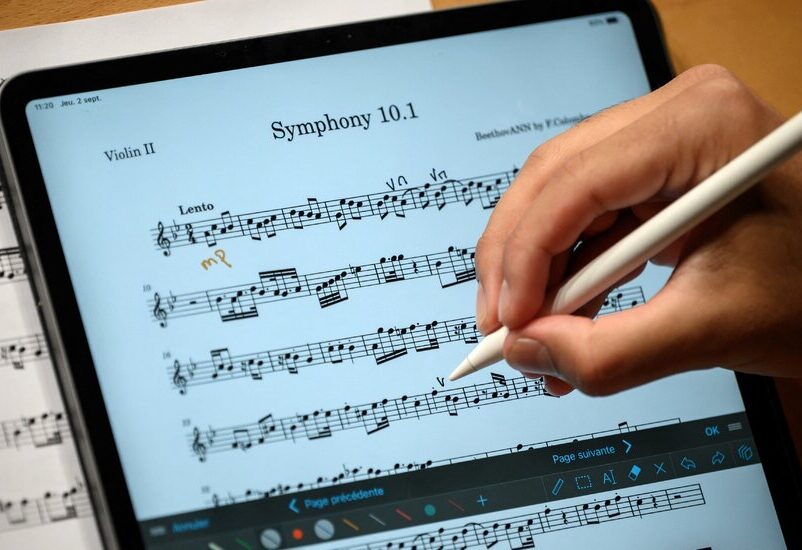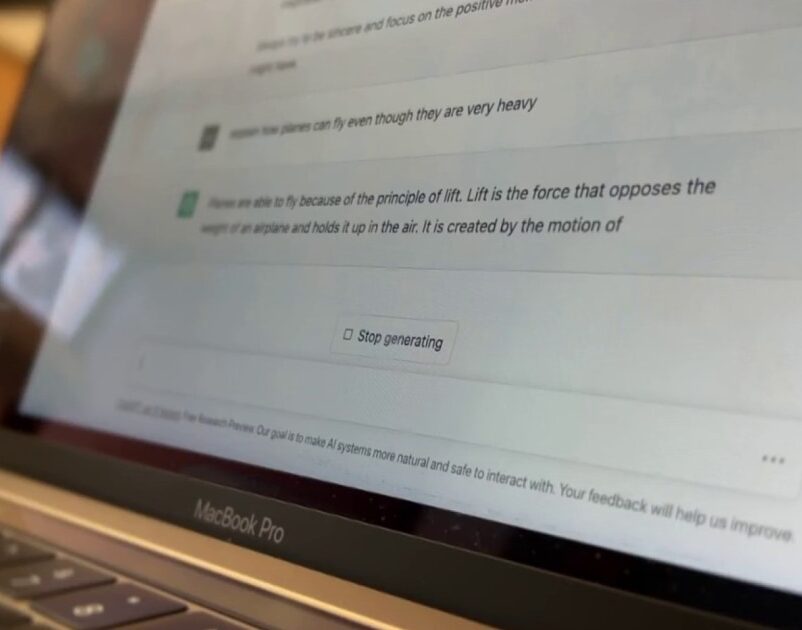
This feature is part of a series called Turning Points, in which writers explore what critical moments from this year might mean for the year ahead. You can read more by visiting the Turning Points series page.
Lens is a close look at an emerging global trend or insight through creative narrative.
The year 2023 was full of complex emotions, thoughts and experiences. My daughter took her first steps and said her first words; film and television productions came to a halt as artists fought for new rights in an ever-changing industry and a somewhat unknowable future; and we grappled with the ethics of a new technology that might not be able to replicate my daughter’s first words, but that many see as an existential threat to everything that makes us human, including our artistic expression: artificial intelligence.
As a composer and pianist, my way of exploring, processing and expressing complex feelings is primarily through music. The arts have a way of taking the irreconcilable and translating it into something the gut and the heart understand. Even when words fail us, creating or experiencing art remains a deeply profound — and human — experience. But as we move into 2024, I’ve been struggling with the question of how we might navigate technology’s role in the arts, and A.I.’s nonfeeling, data-driven means of creation.
Let me be clear: I love technology. More and more, I feel woefully ignorant of how it works and how to wield it, and of how much the new technology in my life is learning from, listening to or tracking me. But I would not live without it. It is critical to my work as a composer, where I’m required to create an entirely digital representation of a film’s score before ever recording it with a real orchestra (it never compares to the real thing). And as a music and film nerd, I am constantly devouring every score, recording, movie and interview I can find on the internet. The fact that I can read an analysis of a Mahler symphony and learn what Timbaland sampled for part of the “Work It” beat all in the span of a five-minute Instagram break will never get old to me.
It’s this devouring of information, along with everything else I happen across and mentally download, that I recall when I write music. Naturally, I found my way to ChatGPT soon after its new version was released later last year to see what else it could help me learn and absorb. What I found was thrilling and scary all at once.
The thrills came from asking for 10 pieces of classical music inspired by the ocean and refreshing or adjusting that request until I had nearly 20 pieces of classical music I had never heard before. Or finding out which filmmakers inspired some of my favorite directors. The scares came from asking it to name Black composers and seeing white composers named on the list it generated. Or to ask it to write a scene in the style of a specific writer and, even with the odd phrases and weird artifacts typical of A.I.-generated writing, hear an eerie sense of familiarity in the scene’s tone. I suddenly felt like I couldn’t trust it. How could I rely on an information source that has no basis in fact-checking or research? If we were to trust A.I. with preserving our history for generations to come, what would it rewrite? Would poorly documented stories that don’t live on the internet be lost and forgotten?
After a while, however, I returned to ChatGPT with a new mindset, informed by my early career.
I started off as a composer for documentaries, and I’ve made a couple of my own as well. As I studied the form, I quickly fell in love with the cinéma vérité style of creating a film that is as observational as possible, with minimal narration and a goal of recording without letting the filmmaker become a character in the story. I loved the gritty nature of the camera work, and the choice to just sit and watch. The style’s long, uninterrupted shots of people simply existing can be starkly beautiful. But as I learned more about the “dos” and “don’ts” of the medium, I became curious about the idea of “truth” in cinema. The camera person chooses what to film. The editor must choose what to cut. The director must ultimately choose what story the footage will tell. How can any of these people completely remove their inherent biases from the creative process?
It reminded me of jazz. As improvisers, we are always open to whatever arises in the moment. Whether it’s a note the bass player plays, or a rhythm from the drummer, we’re like antennas waiting to pick up a signal, drawing inspiration from what’s arising in the moment. But even the most original improvisers sound like themselves. They have tendencies, a touch and sound on their instrument that will always be there, no matter the night. I imagine the same is true for every artist working in cinéma vérité. Some cinematographers may like to shoot more intimately. Some editors like cutting with a specific pace or rhythm. We can’t help but create based on where we come from and how we’ve learned to see the world. Even in an art form whose literal translation is “truthful cinema,” the “truth” is still filtered.
The same can be said about A.I. I had come to ChatGPT looking for an omnipotent information source, and instead found a program’s best guess at answers based on what it had collected from the internet. Instead of a teacher, I found something grown from a world of misinformation and massive amounts of text that might teach an algorithm how to write, but not how to understand. As an artist, I felt a bit of peace knowing that A.I. has no way of knowing how we transpose life experiences and complex emotions into words on a page or notes in a tune. An A.I.-generated ripoff of an artist will always have artifacts of the randomness and falsity of the internet.
Knowing that, and approaching A.I. as just another art form — information generated from and filtered through many different perspectives — makes it just another interesting source of inspiration. As a society, we owe it to ourselves and future generations to supply these algorithms with accurate, diverse and widely reviewed pieces of information. And as an artist, I’m excited to see how A.I. grows, and to respond to anything it “makes” in the same way I would any other creator: with a dose of professional skepticism and an eye toward the sources that inspired it.
Kris Bowers is an Academy Award- and Emmy-nominated composer, filmmaker and musician. He composed scores for the upcoming films “The Color Purple” and “Origin,” and his previous credits include “Green Book,” “King Richard” and the Netflix series “Bridgerton.”



